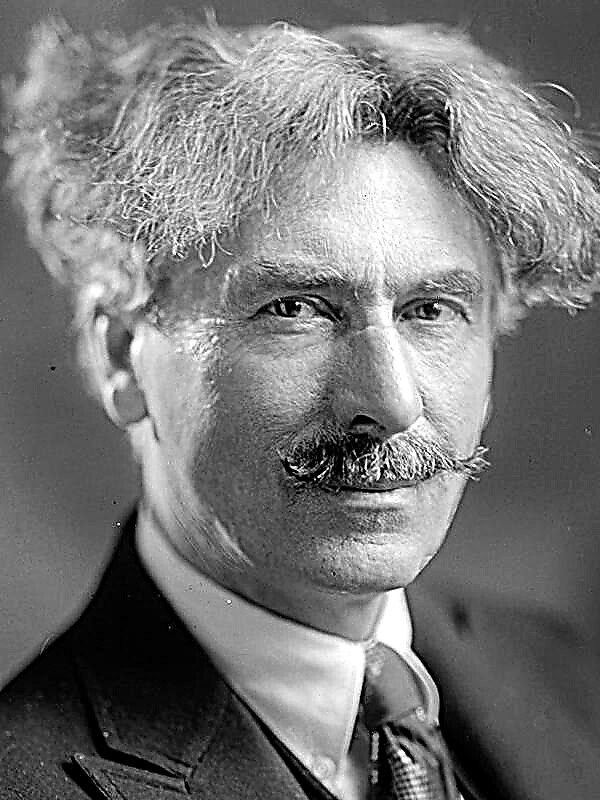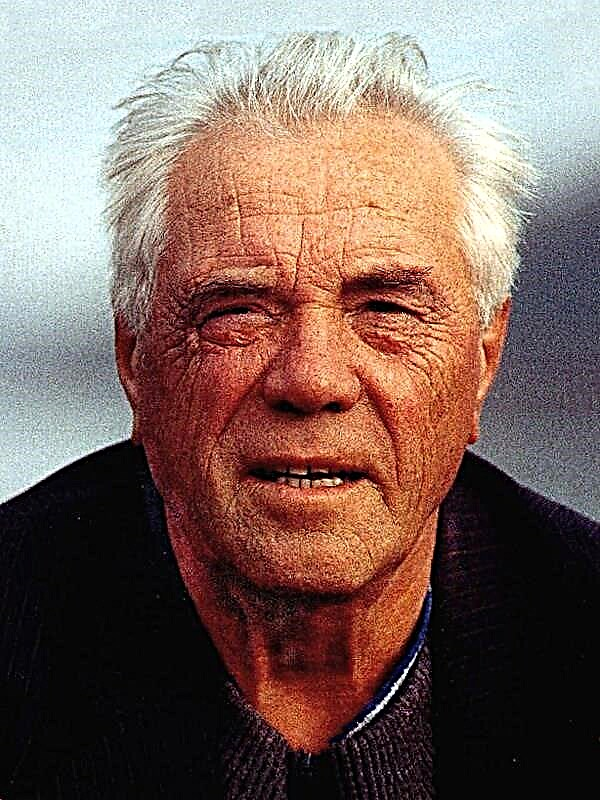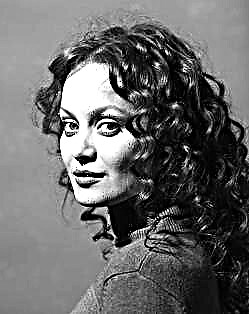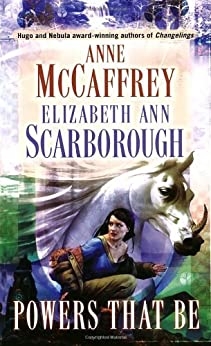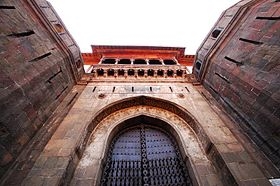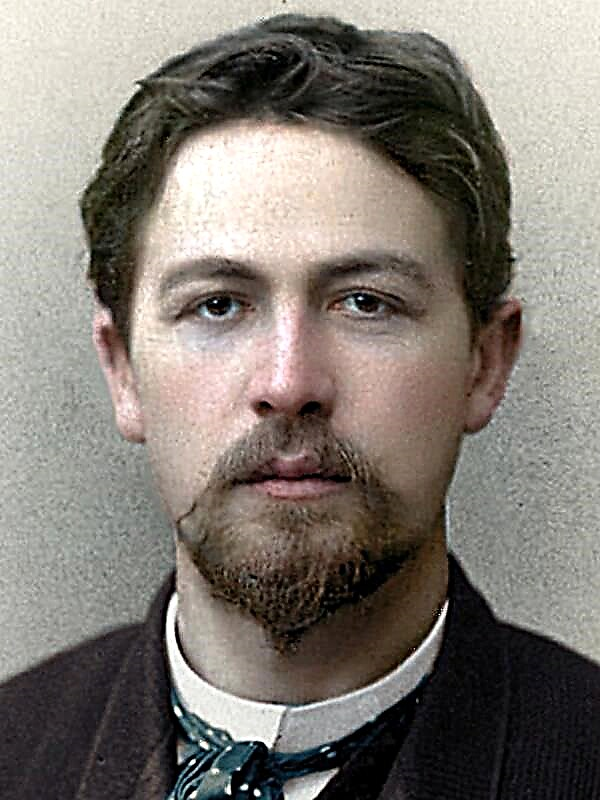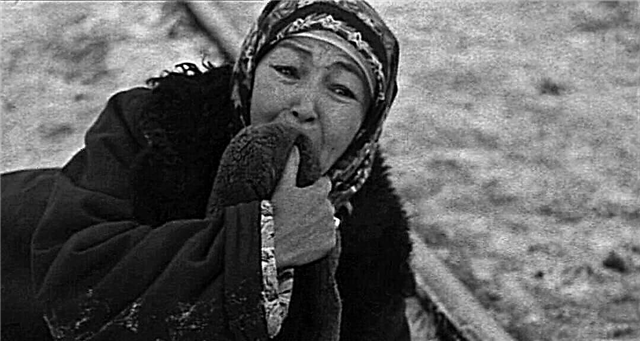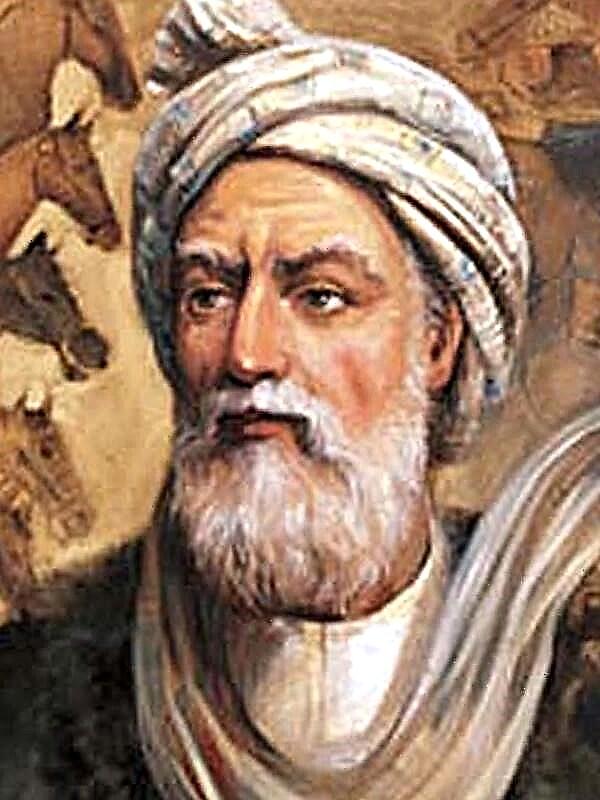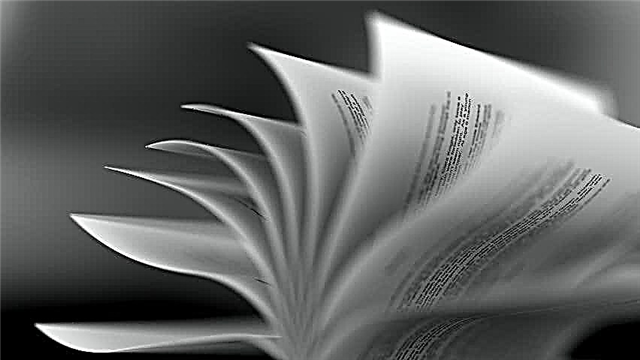The truth of this legend is evidenced by the Bisutun rock with images carved on it, the ruins of Medain, traces of a milk stream, the passion of the unfortunate Farhad, the rumor about Barbad’s ten-string saz ...
In ancient Iran, not yet illuminated by the light of Islam, the just king Hormuz reigns. The Almighty grants him a son, like a wonderful pearl, caught from the "royal sea". Father calls him Khosrov Parviz (Parviz - “Hanging at the chest” of the court nurse).
Khosrov grows up, grows up, learns, comprehends all the arts, becomes eloquent. At ten, he is an invincible warrior, a well-aimed archer. At fourteen, he began to ponder the meaning of good and evil. Mentor Buzurg-Umid teaches the young man many wisdom, reveals to him the secrets of the earth and heaven. In the hope that longevity would be granted to such a worthy heir, the shah became more severe in punishing criminals, all libertines and robbers. The country is prospering, but misfortune happened ... Once Khosrov, who went to the steppe for hunting, makes a halt in a green meadow. He drinks all night with friends, and in the morning he hangs out. Tsarevich’s horse was caught by the inhabitants of a neighboring village. One of Khosrov’s slaves plucks several brushes of unripe grapes in a strange vineyard, thinking that he is ripe. The Shah is informed that Khosrov does lawlessness and is not afraid of the king of kings. Hormuz commands to cut the horse's tendons, to give the guilty slave to the owner of the vineyard, and transfer the throne of the prince to the owner of the house, which gave shelter to revelers. The musician who breaks the night's peace breaks his legs and breaks the strings on the chang. Justice is one for all.
The penitent Khosrov puts on a shroud and, with a sword in his hands, prostrates himself before his father’s throne. The gray-haired old men cry for forgiveness. The heart of the shah is touched. He kisses his son, forgives and appoints the leader of the army. Khosrov’s face now “radiates justice”, “royal features” appear on his face. In a dream, he sees his great grandfather Anushirvan announcing that he will be awarded for the fact that the grandson humbled pride. Having tasted sour grapes without a sour mine, he will receive a beauty in his arms, sweeter than which the world has not seen. Resigned to the loss of a horse, he will get a black horse Shabdiz. A hurricane will not even overtake dust from under the hooves of this horse. In return for the throne given to the peasant, the prince will inherit a throne similar to the “golden tree”. Having lost the changist, Khosrov will find the wonderful musician Barbad ...
A friend of Khosrov, Shapur, who traveled the world from the Maghreb to Lahore, the rival of Mani in painting and the winner of Euclid in drawing, tells of the miracles seen on the shores of the Derbent Sea. There reigns the formidable queen of Shemirah, also called Mehin Banu. She commands Arran all the way to Armenia, and the clang of weapons of her troops is heard in Isfahan. Mehin Banu has no husband, but she is happy. Blossoming in the spring lives in Mugan, in the summer - in the Armenian mountains, in the autumn hunts in Abkhazia, in the winter the queen pulls in dear Barda. Only her niece lives with her. The girl’s black eyes are a source of living water, the camp is a silver palm, and the braids are “two blacks for collecting dates”. Shapur gorgeously depicts the beauty of a girl whose lips have sweetness herself, and her name is “Sweet” Shirin. Seventy lunatic damsels from noble families serve Shirin, living in luxury. Precious of all the treasures of Mehin Banu is the rock-black horse of Shabdiz, hindered by a golden chain. Khosrov, admired by the story of a friend, loses sleep, thinks only of an unknown peri. Finally, he sends Shapur to Armenia for Shirin. Shapur rushes in the Armenian mountains, where the azure cliffs are dressed in yellow and red robes of flowers.
Dismounting against the walls of the ancient monastery, he hears the wise monk talking about the birth of Shabdiz. Having learned from the monks that tomorrow there will be games of court beauties in the meadow, the skillful painter Shapur paints a portrait of Khosrov, ties the picture to a tree and disappears. Beauties feast on the lawn, suddenly Shirin sees a portrait and spends several hours in contemplation. The girls are frightened that Shirin went mad, they tear up the drawing and take the princess to another meadow. The next morning, Shirin finds a new drawing on the path. Again morning, and again Shirin finds a portrait of a beautiful young man and suddenly notices his image in the drawing. Girlfriends promise Shirin to find out everything about the handsome man depicted. In the image of the magician is Shapur, who says that he depicted Parviz in the portrait of Tsarevich Khosrov, but in life the prince is even more beautiful, because the portrait is “faithful to the signs, but devoid of soul”. Shapur describes the wisdom and valor of Khosrov, burning with passion for Shirin, invites her, riding Shabdiz, to run to Khosrov and hands her a ring with the name of the prince. Shirin, in love, persuades Mehin Banu to free Shabdiz from the bondage. The next morning, having gone hunting with her friends, she overtakes them and rushes on Shabdiz on the way to the shah capital of Medain. But Mehin Banu, who dreamed of a future disaster, does not order to begin the chase. In sorrow, the queen decides to wait for the return of Shirin. Meanwhile, Shirin, tired on the way, covered with "dust of forests and mountains", tied her horse to a tree on a deserted lawn to swim in the spring.
Khosrov’s bad business. An insidious foe, wishing to quarrel the prince with his father, minted dirhams with the name of Khosrov and sent them to the cities. "The old wolf shook before a young lion." Buzurg-Umid offers Khosrov to leave the palace for a while, to get away from troubles and intrigues. Khosrov is jumping along the road towards Armenia. Having parked on the lawn and leaving the slaves at a distance, he sees a horse "decorated like a peacock on a leash and a gentle pheasant swimming in a paradise spring." Suddenly, in the moonlight, the naked Shirin saw Khosrov and, ashamed, sheltered herself in the waves of her hair. The noble Khosrov turns away. The young man is in a traveling dress, but he looks so much like a prince from a portrait. Shirin decides that here is no place for explanation. Khosrov looks around, but Shirin has already rushed off to Shabdiz.
Desperate, the prince rushes to the Armenian kingdom. Shirin arrives at Medain and shows the ring of Khosrov. Shabdiz is placed in the royal stable. Communicating with his servants as an equal, Shirin tells tales of himself. It becomes clear to her: the handsome young man was Khosrov himself. Grieving and resigned, Shirin refers to the will of Khosrov and orders the architect to erect for her a castle in the mountains. Bribed by envious women, the builder chooses the hottest and most dead place. Yet Shirin moves to a new home with several maids. Meanwhile, Khosrov is in Armenia, nobles come to him with offerings. Finally, Mehin Banu herself royally receives a guest. Khosrov agrees to spend the winter in Barda. Here he drinks "bitter wine and grieve for Sweet." The feast sparkles with all colors. Wine jugs, dishes, flowers, pomegranates and oranges ... Shapur appears and tells Khosrov how Shirin bent to escape. Khosrov understands that the girl bathed in a stream, and there was Shirin, that now she is in Medain. He again sends Shapur for Shirin. Feasting with Mehin Banu, Khosrov spoke of Shirin. Upon learning that Shirin was found, the queen gives Shapur Gulgun, the only horse able to keep up with Shabdiz. Shapur finds Shirin in the monastery, which seemed to him a torture chamber, and takes her to the Gulgun. Khosrov learns about the death of his father and, grieving, reflects on the vicissitudes of fate. He ascends to the throne of his father. At first, it pleases everyone who is oppressed with their justice, but gradually departs from state affairs. Every day he is on the hunt, not a moment passes without wine and fun. Yet the heart draws him to Shirin. The courtiers say that Shapur took her away. Shabdiz reminds of her. The Shah takes care of him, remembering the moon-faced. Mehin Banu met Shirin affectionately, without reproach. She already guessed the "signs of love" in both her niece and young shah. Shirin is again among his friends - indulges in former fun ...
Meanwhile, Bahram Chubin, who has an iron will, having described Khosrov’s vices (including excessive love for Shirin) in secret messages, overthrows him from the throne. “The head is more valuable than the crown” - and Khosrov escapes to Shabdiz. He runs to the Mugan steppe, where he meets Shirin, who went hunting. They recognize each other, both shed tears of happiness. Shirin is unable to part with Khosrov. Shirin on interchangeable horses sends news of the arrival of a distinguished guest. In a magnificent palace Khosrov tastes the sweetness of communication with Shirin. Mehin Banu decided to "protect brushwood from fire." Shirin vowed to promise her not to retire with Khosrov, to speak with him only in public. Khosrov and Shirin hunt together, have fun. Once, in the midst of a feast, a lion bursts into Khosrov’s tent. Shah kills a lion with a fist. Shirin kisses Khosrov’s hand, he kisses his beloved on the lips ... At the feast, the princess and her friends tell parables about love; Khosrov’s heart rejoices, he longs for intimacy with his beloved. She sees that “her chastity is about to be put to shame,” and runs away from Khosrov’s embrace. Their explanation is endless. Shirin tells Khosrov that defeating a woman is not a manifestation of courage, pacifying his ardor is courage, and urges him to regain his kingdom. Khosrov is offended by Shirin, because because of love for her, he lost his kingdom. Replacing the crown with a helmet, Khosrov on Shabdiz jumps to Constantinople to the Romanian Caesar. Caesar is pleased with such luck and gives his daughter Mariam as a shah. With countless Romanian troops, Khosrov sets out on a campaign and defeats Bahram Chubin, who flees to Chin (China). Once again, Khosrov reigns in Medain. In his palace is the young Mariam, but for Shirin’s hair he is ready to give away a hundred kingdoms similar to the wealthy Khotan. Days pass in regrets and memories, and Shirin, having parted with Khosrov, lives "without a heart in his chest." Mehin Banu dies, handing Shirin the keys to the treasury. The reign of Shirin is generous. Citizens rejoice, prisoners are free, taxes from peasants and the tax levied at the city gates are canceled, cities and villages are well-maintained. But the queen yearns for Khosrov and asks the caravans about him. Learning about Khosrov’s luck, she rejoices, distributes jewelry to people, but, hearing about Mariam, marvels at her heart’s inconsistency ... Mariam is strict, she still made Khosrov swear allegiance in Rum. Shirin, sadly, transfers power to his close associate, goes to Medain, settles in his red-hot castle and sends the message to Khosrov, but the lovers are afraid of Mariam and cannot see ...
Longing for Shirin deprives Khosrov of strength, and he orders the musician and singer Barbad to appear at the feast. Barbad performs thirty songs, and for each song Khosrov gives him a pearl robe. Khosrov dares to ask Mariam for condescension to Shirin, but Mariam’s mouth is poorer than poison. She replies that Khosrov will not be able to taste halva, let her be content with dates! And yet one day he decides to send Shapur for Shirin. But Shirin refuses secret dates. The beautiful woman, living in a “crowded heart” valley, drinks only milk, sheep and mares, but it is difficult to deliver, because poisonous grass grows in the gorge, like a snake sting, and the shepherds drove off their herds and herds. Handmaids get tired, delivering milk, it would be necessary to shorten their path. Shapur talks about the architect Farhad, young and wise. They studied together at Chin, but "he threw the brush to me, he got the cleaver." Farhad was introduced by Shirin. Breaking through the mountains, he himself looks like a mountain. The body is like an elephant, and in this body is the power of two elephants. She spoke with Farhad Shirin, and even Plato can lose her senses from the sounds of her voice. Shirin talks about his business: it is necessary to lay a canal in stones from a distant pasture to the castle so that the milk flows here by itself. Desire Shirin is a command for Farhad. Under the blows of his pickaxe, the stones become wax. In a month, Farhad cuts a channel in the rocks and spreads it with hewn stones. Having seen Farhad’s work, Shirin praises him, puts him above his associates, gives expensive earrings with stones, but Farhad puts gifts at Shirin’s feet and goes into the steppe, shedding tears.
In the longing for Shirin in the evenings, Farhad comes to a milk stream and drinks sweet milk. Word of mouth passes the rumor about the fate of the architect, she reaches the ears of Khosrov. He felt a strange joy, learning that another madly in love had appeared, but jealousy prevailed. He calls on Farhad, argues with him, but farhad is not able to renounce the dream of Shirin. Then Khosrov invites Farhad, to the glory of Shirin, to punch the passage through the granite mountain Bisutun. Farhad agrees, but on condition that Khosrov refuses Shirin. Labor is overwhelming, but the master immediately begins to work. First of all, he carved the image of Shirin on a rock, portrayed Khosrov, jumping on Shabdiz. Crushing rocks, cutting into the mountain, farhad sacrifices his life. Shirin visits him at Mount Bisutun, welcomes, gives him a bowl of milk. Horse Shirin stumbled in the mountains. Farhad carries Shirin with her horse to the castle. And again returns to his work. Khosrov is afflicted by the news of the meeting between Shirin and Farhad; they inform him that the work is nearing completion. Advisers offer him to send a messenger to Farhad with news of Shirin's death. Hearing of this, Farhad in despair throws a pickax into the sky, and, falling, she smashes his head. Khosrov writes a letter to Shirin with an expression of feigned condolences. Mariam is dying. Out of respect for her dignity, Khosrov withstands the full term of mourning, continuing to dream of an unbending Shirin. To “spur” her, he decided to resort to tricks: you need to find another lover. Having heard about the delights of the Isfahan beauty Shakar, he goes to Isfahan.
Feasting with Khosrov, Shakar waits each time for his intoxication and at night substitutes himself a slave. Convinced of the beauty’s chastity, Khosrov marries her, but soon, fed up, exclaims: “I can’t live without Shirin! How much can you fight with yourself? ” At the head of the magnificent procession, Khosrov, under the pretext of hunting, rushes into the possessions of Shirin. Seeing his beloved, Shirin loses consciousness, but Khosrov is drunk, and, fearing him, ashamed of rumors, she orders to close the doors of the castle. A brocade tent was laid out for Khosrov, food was sent, Shirin throws rubies from the ramparts under the hooves of Shabdiz, and pours Khosrov’s head with pearls. Their long conversation, full of reproaches, threats, arrogant pride and love, does not lead to peace. Shirin reproaches Khosrov: he had fun when Shapur worked with a pen, and Farhad with a pick. She is proud, and outside the marriage bond the shah does not get what she wants. Khosrov rides away in anger, complaining to Shapur along the way. He is humiliated. Shapur calls for patience. After all, Shirin was exhausted. Truly, she suffers from the fact that Khosrov left her. Shirin throws his castle and in the slave rags arrives at Khosrov's camp. Shapur triumphantly leads her into a magnificent tent, and he hurries to Khosrov, who has just woken up. In a dream, he saw that he picked up a burning lamp. Interpreting a dream, Shapur portends to Khosrov bliss with Shirin.
Khosrov feasts and listens to musicians. Shirin, the ruler of Khosrov, appears in the tent and falls at his feet, like a slave. Shirin and Khosrov attracted to each other, like a magnet and iron, and yet the beauty is impregnable. The Shah tells the stargazers to figure out an auspicious day for the wedding. A horoscope is being compiled. Khosrov brings Shirin to Medain, where the wedding is celebrated. Shirin offers Khosrov to forget the wine, because from now on it is for him - a cup of wine and a cupbearer. But he is drunk to insensibility in the bed. Shirin sends Khosrov an elderly relative to make sure that he is able to distinguish the moon from the cloud. Horrified, Khosrov sobers up in the blink of an eye. In the morning he is awakened by a kiss of Shirin. The lovers are finally happy, they reach the peak of desires, and the next night and day they sleep soundly. Khosrov gives the beauty Humayun Khapurov, Nakisa became the spouse of Humeila, a musician and noble nobleman, Samanturk is given to Barbad. Buzurg-Umid was married to the Khotan princess.Shapur also took possession of the whole kingdom of Mehin Banu. Khosrov is blissful, spending time in the arms of Shirin. Either he plays backgammon, sitting on a golden throne, then he rides on Shabdiz, then he eats the honey of the game of Barbad. But jasmine gray has already appeared in dark violet hair. He thinks about the transience of things. Shirin, a wise mentor, directs Khosrov on the path of justice and wisdom. The Shah listens to the parables and teachings of Buzurg-Umid and repents of his deeds. He is already ready with a light heart to part with the insidious world. Sorrows of Khosrov, Shiruya, his incorporeal and wicked son from Mariam. Khosrov retires to the temple of fire, the throne captures Shiruye, Only Shirin is allowed to the prisoner and consoles him. Shiruye mortally wounds his father, Khosrov dies, bleeding and not daring to embarrass Shirin's dream, sleeping nearby. Shirin awakens and, seeing a sea of blood, weeps. Having washed the shah’s body with camphor and pink water, clothed it, she herself wears everything new. The father-killer wooed to Shirin, but, having buried Khosrov, she hit herself with a dagger in the tomb of her beloved.

